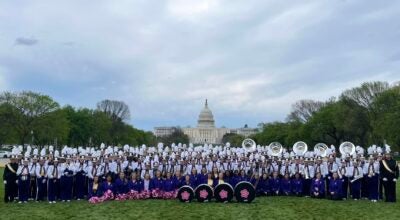Legislators: State faces budget challenges
Published 7:19 pm Friday, January 9, 2009
A sour economy continues to threaten the jobs and livelihood of Southwest Georgians, but the state legislators representing Decatur County say there is hope as they head back to Atlanta for a new session starting this Monday.
With the national unemployment rate hitting 7.2 percent, the highest rate in 16 years, and Southwest Georgia’s moving even higher, times are increasingly tough for people trying to weather the economic storm as well as the governments charged with serving them.
“We passed a balance budget for the state last year of $21.8 billion,” said House Rep. Gene Maddox (R-Cairo). “We’ve taken in about $1.5 billion less, made budget cuts of six percent, and we’re still down and facing more cuts.”
Perhaps the most immediate impact the state’s budget crunch could have is changes to the state offices and agencies that serve Decatur County and the surrounding area. Gov. Sonny Perdue’s requests that state agencies cut 6 to 8 percent of their budgets has resulted in a changing operations.
Already, state prosecutors and public defenders have been asked to take unpaid days off along with employees of the Department of Family and Children Services and the Department of Corrections, which operates the Probation Substance Abuse Treatment Center in Bainbridge, according to State Sen. John Bulloch (R-Ochlocknee).
Area Sheriff’s Offices have been forced to send corpses for autopsies to Atlanta, because of a statewide hiring freeze and an unfilled position at the Georgia Bureau of Investigation’s Moultrie crime lab, Bulloch said. If further budget cuts are needed, the GBI may opt to close its Moultrie crime lab altogether, which would mean evidence would have to be sent to Macon or Columbus, he said.
“It affects taxpayers because it costs more money to transport the evidence,” Bulloch said.
Other impacts
Worse yet, the Georgia Department of Human Resources has proposed closing Thomasville’s Southwestern State Hospital, which serves residents of 24 counties, including Decatur, who have mental illness, developmental disabilities or chemical dependency. It also employs hundreds of people, some from Decatur County. Bulloch stressed the closure is only an idea and would take three years to complete. Still, he said he will join other area legislators in fighting to keep it open.
A state education study panel released a study last December that recommended Georgia’s two-year colleges be moved from under the Board of Regents to the technical college system.
There have been proposals to consolidate colleges elsewhere. While Bulloch had not yet seen the report, he said he was confident Bainbridge College wasn’t going anywhere.
“What you’re doing is putting institutions under a single management,” he said. “So a president of a technical college may have to take over responsibility for another one. It’s a move to cut costs on overhead and would not affect instruction capabilities.”
On a positive note, Bulloch said it appears nearby Seminole State Park may be able to weather cost-cutting plans by the Georgia Department of Natural Resources. He said DNR officials are looking hard at costs and annual visitor totals for parks all over the state. State parks with golf courses, like the one at Lake Blackshear, may end up being privatized, he said.
The hunt for more revenue
Both Bulloch and Maddox said the state budget shortfall is prompting legislators to look at new sources of revenue.
Bulloch said he would work to reinstate the homestead tax exemption, which Gov. Perdue froze last year in an effort to shore up the state’s revenue.
Maddox also opposes new taxes but said the state is in dire need of more revenue.
One of the proposals legislators will look at is whether to allow local governments and regions to levy a one-cent sales tax for local transportation needs. Voters would have to approve a constitutional amendment for the so-called “T-SPLOST” and the referendum couldn’t take place until November 2010.
Just as they did during last year’s session, legislators may look at legislation that would change Georgia’s property tax laws in various ways with the goal of reducing citizens’ tax burden, Maddox said.
The State Senate will consider whether to allow local governments to have referendums on whether to allow their areas to have Sunday alcohol sales at places like convenience stores and supermarkets.
“I don’t have a problem with letting local people decide,” Bulloch said. “I don’t think you would see places like Bainbridge or Thomasville go for it, but it may be appropriate for places around Atlanta.”
Other issues
Both the House and Senate will once again consider legislation that would force the use of seatbelts in pickup trucks. The Senate’s version would allow an exception for vehicles used primarily for agriculture, which Bulloch, a farmer himself, said would be critical.
“There’s not a law saying truck drivers can’t use seatbelts if they want to,” he said. “The way I look at it, it’s my life and my truck … when I’m going between my house and my farm and getting out to check on equipment and fields, I don’t want to be breaking the law.”
Health: “I think there will be a lot of debate on health issues,” Maddox said. “We’re going to try and fund more trauma care like what’s available at Archbold [Medical Center in Thomasville].”
Guns: “There are more proposed changes to Georgia’s gun laws but I’m not sure if they will get far,” said Bulloch. “I support the Second Amendment, but we have to be responsible and practical.”
Bipartisan elections: “In 2005, I sponsored a bill which would have let sheriffs, district attorneys and solicitor generals to run for office without declaring a party,” Maddox said. “It’s come up again and if I get the chance, I will vote for it.”





